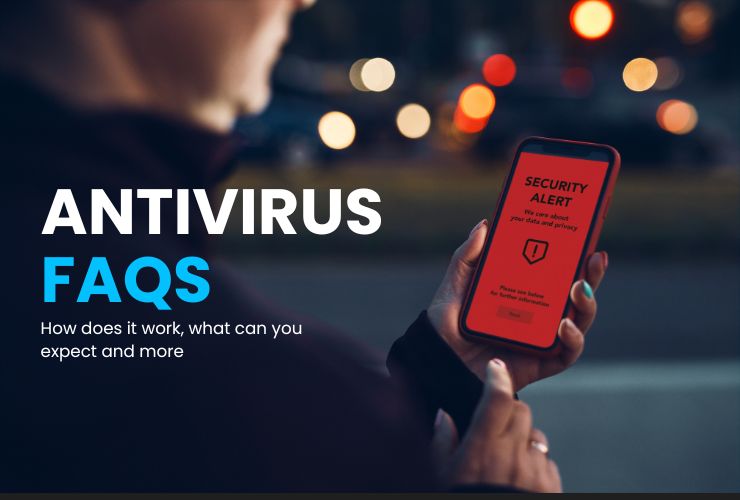Antivirus FAQs

Antivirus. A lot has been said about this topic, and yet, not all questions have been answered. What is it meant for, how does it work, and how can you know you are protected? Before we dive headfirst into how antivirus works, let's address a common misconception: antivirus software is not an all-encompassing security solution. While it plays a vital role in protecting your devices, it has limitations.
What Antivirus Software Cannot Do:
- Stop All Cybercrime: While antivirus software excels at detecting and blocking malware like viruses, worms, and Trojans, it doesn't safeguard against all online threats. Other forms of cybercrime, such as:
- Identity theft: This involves stealing your personal information like social security numbers, credit card details, or passwords to commit fraud or impersonate you.
- Phishing attacks: These are cleverly disguised emails or messages designed to trick you into revealing sensitive information or clicking malicious links that can infect your device with malware.
- Account takeovers: Hackers can gain unauthorized access to your online accounts, including email, bank accounts, or social media profiles, causing financial loss or reputational damage.
- Zero-day attacks: These are novel, previously unknown malware variants that traditional antivirus software may not be able to detect immediately.
- Guarantee Absolute Security: No security software is foolproof. Antivirus software relies on constantly updated databases of known threats, and new malware strains emerge daily. Additionally, user behavior plays a crucial role in maintaining online safety. Clicking suspicious links, opening unknown attachments, or downloading untrusted software can bypass even the strongest antivirus software.
How Does Antivirus Software Work?
Despite its limitations, antivirus software remains a critical layer of your online defense. Here's a breakdown of two common methods antivirus software employs:
- Signature-Based Detection: This method involves comparing files and programs against a database of known malware signatures. Think of it like checking a list of wanted criminals against everyone entering your city. If a match is found, the antivirus software quarantines or removes the threat.
- Heuristic Analysis: This method goes beyond simple signature matching and analyzes the behavior of programs. If a program exhibits suspicious behavior, such as attempting to modify system files or access sensitive data without authorization, the antivirus software may flag it for further investigation or possible removal.
Advanced Techniques: Modern antivirus software often combines these methods and incorporates additional technologies like:
- Machine Learning: This allows the software to learn and adapt to new threats by analyzing vast amounts of data and identifying patterns indicative of malware.
- Behavioral Monitoring: This involves continuously monitoring the behavior of programs and processes running on your device, flagging any suspicious activity.
- Sandboxing: This creates a virtual environment to safely run suspicious files before allowing them to interact with your actual system, minimizing potential damage.
Choosing the Right Antivirus Software:
With various antivirus options available, choosing the right one can be overwhelming. Consider factors like:
- Detection Rates: Look for software with high detection rates for various malware types, including viruses, worms, ransomware, and spyware.
- System Performance: Some antivirus software can slow down your device. Choose one that offers a good balance between protection and performance.
- Additional Features: Some antivirus software offers additional features like firewalls, anti-phishing protection, and parental controls, depending on your specific needs.
Antivirus software is an essential component of your digital defense, but it's not foolproof. To stay safe online, practice safe browsing habits, be cautious about the information you share online, and keep your software (including your antivirus) up to date. By combining strong antivirus software with a proactive approach to online safety, you can significantly reduce your risk of falling victim to cyber threats.
Check our Antivirus out if you are interested.